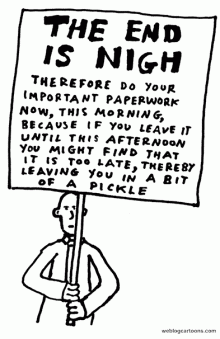 While we may have thought that we made it through May 21 unscathed, I received two messages yesterday that our friends in the colonies might have considered providential signs.
While we may have thought that we made it through May 21 unscathed, I received two messages yesterday that our friends in the colonies might have considered providential signs.
The first was an email from Peggi Zelinko at the Department of Education. She wrote to say that no new Teaching American History proposals would be awarded FY 2011, ending any hope that “Competing Visions: Debates that Shape America”, the excellent proposal we submitted in March, would be funded. This confirmed my suspicions – but was disappointing nevertheless.
The second was a posting on the National Coalition for History site:
HOUSE PANEL CLEARS BILL TO TERMINATE TEACHING AMERICAN HISTORY GRANTS
The House Education and Workforce Committee this week approved, by a strict party line vote of 23-16, H.R. 1891 the “Setting New Priorities in Education Act.” This bill would eliminate 43 programs at the Department of Education including Teaching American History (TAH) grants.
An amendment was offered by Representative Rush Holt (D-NJ), and cosponsored by Representatives Davis (D-CA), Woolsey (D-CA) and Wu (D-OR) that would have potentially preserved TAH. The amendment would have required the Secretary of Education, in consultation with the Secretary of State, Secretary of Defense and Director of National Intelligence to determine if the United States was experiencing a shortage of linguists. If it was found that was the case, Department of Education funds could have been used to improve foreign language education, economic and financial education, arts education and the Teaching of Traditional American History. The Holt amendment was defeated by the same party line vote of 16-23.
House Education and Workforce Committee Chairman John Kline (R-MI) has decided to adopt a piecemeal approach to reauthorizing the ESEA, considering a series of targeted bills instead of one large one. H.R. 1891 is the first of those bills to be introduced and passed by the panel.
H.R. 1891 will now be considered by the House where it is expected to pass. While this is disheartening, the bill would still have to pass the Senate and be signed by the President which is unlikely. Traditionally, there has been strong bi-partisan support in the Senate for the TAH program.
In the Senate, Health, Education, Labor and Pensions Committee Chairman Tom Harkin (D-IA) will soon introduce a single all encompassing ESEA reauthorization bill. It was expected he would introduce the bill right after Easter, but that has not occurred. There is no indication at this time what Chairman Harkin’s position is with regard to TAH in particular or history education in general.
It’s a shame. Based on our experience, I believe that TAH projects have catalyzed important change, critically supporting teachers in ways that renew and expand their vision and capacity to improve students’ learning experience. I hope that teachers find creative ways to continue the work on their own.
I look forward to next week’s demonstration lesson in Castle Rock and our final “Causes of Conflict” program June 29 & 30. Enjoy the long weekend!






